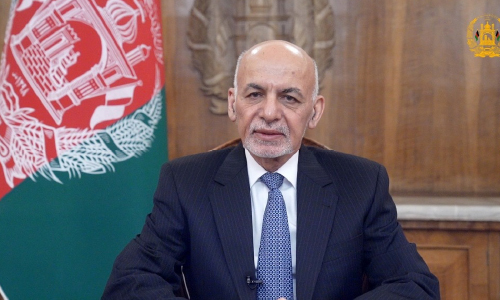KABUL - President Ashraf Ghani said this week that Afghanistan has tremendous potential to produce clean energy and develop an eco-friendly green industry.
Addressing the virtual 2020 Climate Ambition Summit Ghani said: “We have some of the most abundant supplies of sun, water, and wind [in Afghanistan].”
Ghani noted that if all energy sources are harnessed, “this could collectively produce 300,000 megawatts of power.”
He stated that the government is building hydropower stations across the country and scoping the potential for wind and solar farms.
“We recently signed an agreement with Siemens Energy that positions us to become the regional hub for reliable, sustainable and affordable energy,” he noted.
“We have the potential to serve as a platform for environmental cooperation and coordination across the region,” Ghani pointed out.
He also stated that Afghanistan is one of the most vulnerable countries in the world where climate change is concerned.
“For one, the cycle of drought has drastically shortened, from a 33-year cycle to now a five-year cycle. Our seasonal rainfall now comes in spring instead of winter, and with it, lethal floods and destructive erosion,” Ghani said.
He added that the southeastern part of the country is now believed to have gotten 1.5 degrees warmer in the last 40 years and deforestation has been rampant due to the last four decades of conflict.
The Climate Action Summit was held over two days this week and 70 Heads of State, along with regional and city leaders, and heads of major businesses, delivered a raft of new measures, policies, and plans, aimed at making a big dent in greenhouse gas emissions, and ensuring that the warming of the planet is limited to 1.5C.
The number of countries coming forward with strengthened national climate plans (NDCs) grew significantly today, with commitments covering some of the world’s biggest emitters on display.
At least 24 countries announced new commitments, strategies, or plans to reach carbon neutrality, and a number of states set out how they are going even further, with ambitious dates to reach net-zero: Finland by 2035, Austria by 2040, and Sweden by 2045.
Pakistan announced that it’s scrapping plans for new coal power plants, India will soon more than double its renewable energy target, and China committed to increasing the share of non-fossil fuel in primary energy consumption to around 25 percent by 2030.
Home » Afghanistan » Ghani Tells Summit Afghanistan Extremely Vulnerable to Climate Change
Ghani Tells Summit Afghanistan Extremely Vulnerable to Climate Change

